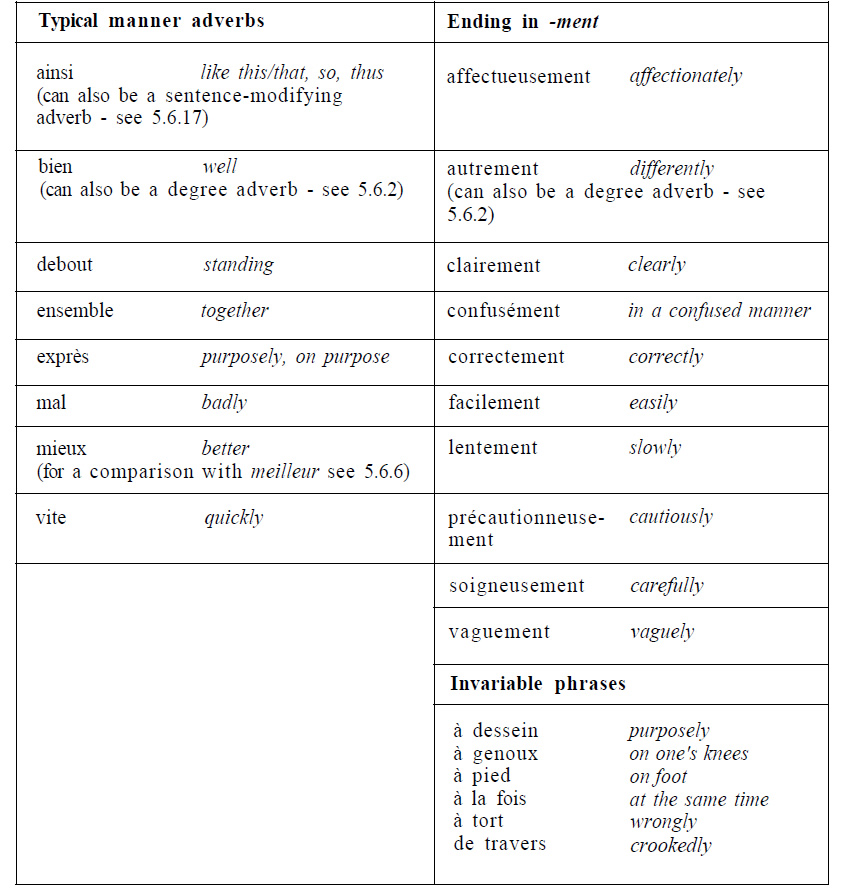Difference between revisions of "Language/French/Grammar/Manner-adverbs"
Jump to navigation
Jump to search
m (Quick edit) |
m (Quick edit) |
||
| Line 1: | Line 1: | ||
[[File:French-Language-PolyglotClub.png|thumb]] | [[File:French-Language-PolyglotClub.png|thumb]] | ||
<div | <div class="pg_page_title"> Manner adverbs </div> | ||
__TOC__ | __TOC__ | ||
| Line 11: | Line 11: | ||
Things are turning out badly | Things are turning out badly | ||
<span link>Finish this lesson and explore these related pages:</span> [[Language/French/Grammar/Possessive-determiners|Possessive determiners]], [[Language/French/Grammar/Omission-of-the-article|Omission of the article]], [[Language/French/Grammar/Polite-Form|Polite Form]] & [[Language/French/Grammar/Direct-object-quantifiers-and-«-en-»|Direct object quantifiers and « en »]]. | |||
==TABLE: Typical manner adverbs== | ==TABLE: Typical manner adverbs== | ||
[[File:French-Language-Manner-Adverbs-PolyglotClub.jpg]] | [[File:French-Language-Manner-Adverbs-PolyglotClub.jpg]] | ||
| Line 17: | Line 17: | ||
==Examples== | ==Examples== | ||
Representative examples: | Representative examples: | ||
*Il s'est toujours comporté ainsi | *Il s'est toujours comporté ainsi | ||
| Line 33: | Line 32: | ||
*Hier soir ça n'allait guère mieux | *Hier soir ça n'allait guère mieux | ||
It was hardly any better yesterday evening | It was hardly any better yesterday evening | ||
*Je l'oublierai très facilement | *Je l'oublierai très facilement | ||
I'll forget it very easily | I'll forget it very easily | ||
*Elle étendait soigneusement son tailleur | *Elle étendait soigneusement son tailleur | ||
| Line 54: | Line 51: | ||
<youtube>https://www.youtube.com/watch?v=MM9lusc6IKQ</youtube> | <youtube>https://www.youtube.com/watch?v=MM9lusc6IKQ</youtube> | ||
== | ==Other Lessons== | ||
* [[Language/French/Grammar/Nouns-which-refer-both-to-males-and-to-females|Nouns which refer both to males and to females]] | * [[Language/French/Grammar/Nouns-which-refer-both-to-males-and-to-females|Nouns which refer both to males and to females]] | ||
* [[Language/French/Grammar/Use-of-il,-ce,-cela-and-ça-as-impersonal-pronouns|Use of il, ce, cela and ça as impersonal pronouns]] | * [[Language/French/Grammar/Use-of-il,-ce,-cela-and-ça-as-impersonal-pronouns|Use of il, ce, cela and ça as impersonal pronouns]] | ||
| Line 70: | Line 67: | ||
* [[Language/French/Grammar/Often-Mistaken-Gender-of-Nouns|Often Mistaken Gender of Nouns]] | * [[Language/French/Grammar/Often-Mistaken-Gender-of-Nouns|Often Mistaken Gender of Nouns]] | ||
* [[Language/French/Grammar/Conjugation-group-3-—-verbs-with-infinitives-which-end-in-—re|Conjugation group 3 — verbs with infinitives which end in —re]] | * [[Language/French/Grammar/Conjugation-group-3-—-verbs-with-infinitives-which-end-in-—re|Conjugation group 3 — verbs with infinitives which end in —re]] | ||
<span links></span> | |||
Latest revision as of 13:56, 27 March 2023
Manner adverbs
Adverbs which describe the manner in which something is done are manner adverbs:
- Je dors bien
I sleep well
- Les choses tournent mal
Things are turning out badly
Finish this lesson and explore these related pages: Possessive determiners, Omission of the article, Polite Form & Direct object quantifiers and « en ».
TABLE: Typical manner adverbs[edit | edit source]
Examples[edit | edit source]
Representative examples:
- Il s'est toujours comporté ainsi
He always behaved like that
- Tu chantes bien
You sing well
- Mets-toi debout
Stand up
- Il a mal lu l'étiquette
He misread the label
- Hier soir ça n'allait guère mieux
It was hardly any better yesterday evening
- Je l'oublierai très facilement
I'll forget it very easily
- Elle étendait soigneusement son tailleur
She carefully laid out her suit
Video: How to form French Adverbs of Manner[edit | edit source]
Videos[edit | edit source]
French Lesson 99 - Adverbs of manner - YouTube[edit | edit source]
How to form French Adverbs of Manner - YouTube[edit | edit source]
Other Lessons[edit | edit source]
- Nouns which refer both to males and to females
- Use of il, ce, cela and ça as impersonal pronouns
- Directly transitive verbs take the auxiliary “avoir”
- Ordinal numbers
- Function of adverbs
- Easy way of generating the simple past
- Choice of some time adverbs relative to the moment of speaking
- Pronominal verbs and body parts
- Position of object pronouns with imperatives
- Negation
- Adjectives modified by adverbs and prepositional phrases
- “être” and “avoir” with verbs used intransitively and transitively
- Subject verb agreement
- Often Mistaken Gender of Nouns
- Conjugation group 3 — verbs with infinitives which end in —re

